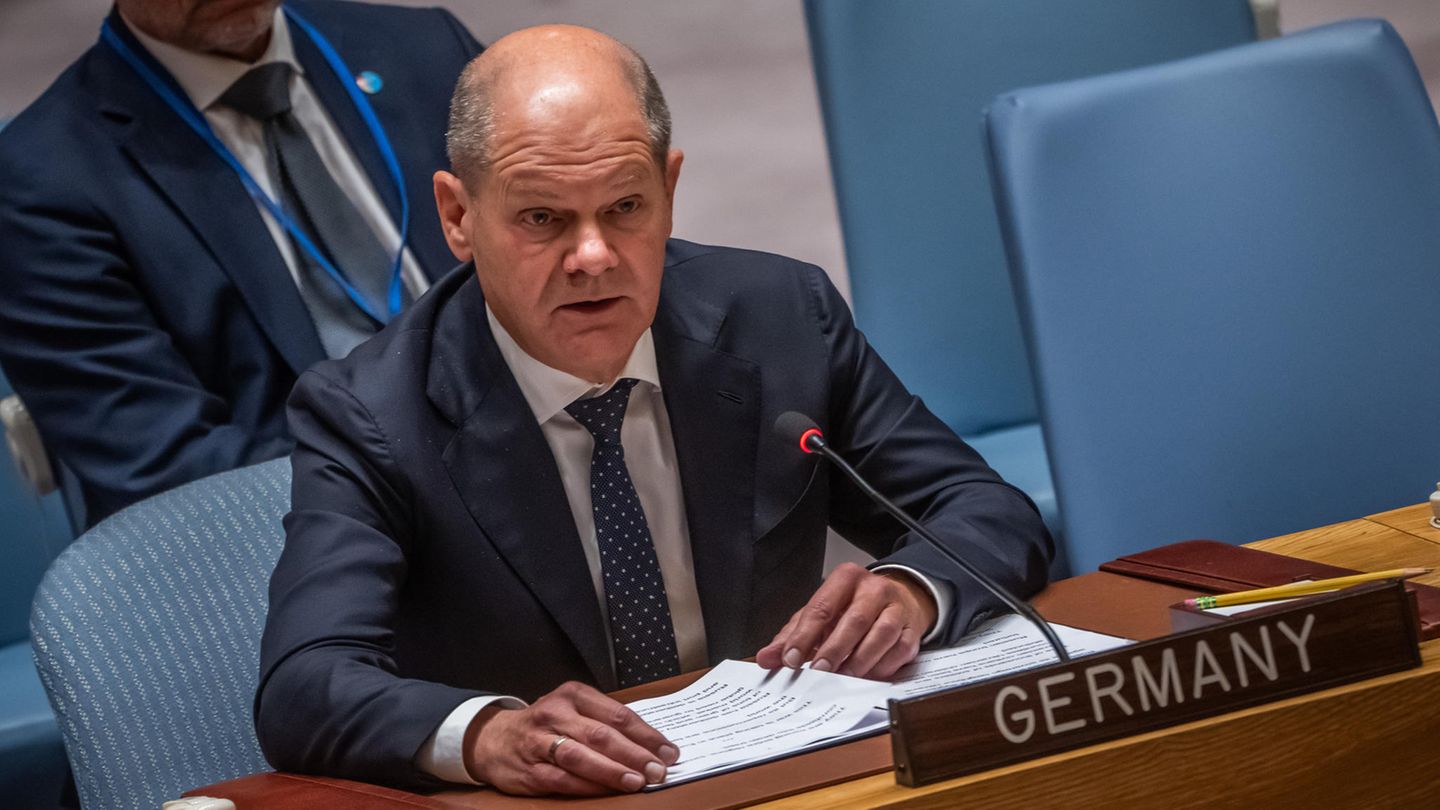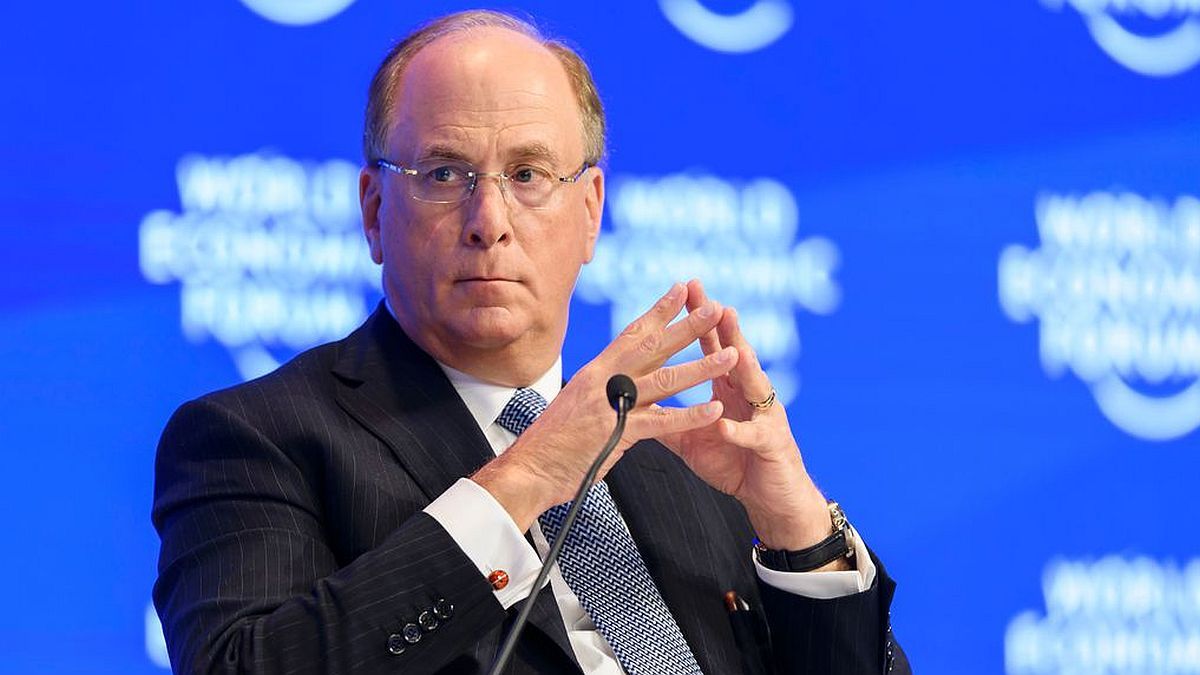The United Nations discusses the war in Ukraine. It turns out that Russia has few friends left. And Germany is clearly no longer one of them
It is 11:05 a.m. in New York when Edi Rama opens a memorable meeting of the UN Security Council. Albania is in the presidency this month, and Prime Minister Rama, with his white beard and sonorous voice, seems ideal for the honorable task he has to carry out on this day.
This will later also include giving the floor to the Chancellor from Germany. And Olaf Scholz, who, like several other speakers, was invited by Rama to this meeting as a guest, will take the opportunity to give a remarkably clear speech. It may well be that Vladimir Putin will angrily ask him about it the next time the two talk on the phone.
Very close
Are you interested in politics? – and read the most important information of the week, selected for you by our Berlin politics experts!
This day is once again about Ukraine. The Russian war of aggression, it must be said, is getting on the nerves of some states because it overshadows many other conflicts and problems. Nevertheless, another signal should be sent on the sidelines of the UN General Assembly – a sign, above all, that Russia has few friends in the world. Very few, in fact, but also powerful ones. Germany is no longer one of them. And this change plays a role again and again in the next few hours, even before the Chancellor has even said anything.
20 years ago it was also about war and peace – back then with Joschka Fischer
The Security Council has already experienced many dramatic meetings on war and peace – including with German participation. In 2003, Germany was a non-permanent member for a year, and Foreign Minister Joschka Fischer even chaired when then-US Secretary of State Colin Powell gave his 90-minute speech about alleged weapons of mass destruction in Iraq. The evidence was the basis for the American attack, but was later proven to be false, and Powell admitted to it star a: “It was one of the biggest disappointments of my life. I believed in this evidence.”
Clarity is also a topic at the meeting around 20 years later. First of all, it’s about formalities. The Russian UN ambassador protests that Ukrainian President Volodymyr Zelenskyi should be given the floor early in the meeting. But Edi Rama has his paragraphs together and gives the Russian ambassador a little lesson. But he doesn’t give in until Rama finally counters him: If the ambassador doesn’t want the Ukrainian president to appear, Russia just has to end the war in Ukraine. Then there would no longer be any reason to invite Zelenskyi.
Zelenskyi complains about “too much rhetoric and too few solutions”
What follows is a series of violent accusations. UN Secretary-General Antonio Guterres accuses Russia of human rights violations and a blockade of grain exports from Ukraine, which is leading to food emergencies in many countries. The war leads to “unlimited suffering” and must end. Then Zelenskyi speaks: Russia has killed tens of thousands of people and turned millions into refugees. This would undermine all international rules. The vast majority of the UN sees Russia as an aggressor, but that has not changed the situation. There is too much rhetoric and too few concrete solutions.
Zelenskyi calls for UN reform that would take away Russia’s right to veto. This is an illusion, and he probably knows it too. In order to promote such a reform, Zelenskyi flatters many supporting states that are not represented in the Security Council. Zelenskyi demands that Germany should also have a permanent seat. And the justification he provides may surprise some German critics of Scholz’s Ukraine policy: Germany, says Zelenskyi, has become a key state in securing peace and stability. “That’s a fact.”
Then Sergei Lavrov suddenly sits at the table – and complains back
The next speakers don’t mince words either. Again it’s about clarity, this time regarding the situation in Ukraine. Attackers and victims must be clearly named, says Edi Rama, who is now speaking not as chairman, but as Albanian Prime Minister. The presidents of Ecuador and Ghana also condemn the Russian war of aggression. Even Switzerland, which likes to hide behind its neutrality on specific issues, is calling for the withdrawal of Russian troops. Japan’s Prime Minister talks about his visits to Kiev and Bucha. “I will not forget the heartbreaking feelings I had there,” says Fumio Kishida. Malta sides with Ukraine, Gabon and Great Britain, some more clearly, some more cautiously. The Russian ambassador has long since left the room. The government representative in Moscow is now representing himself.
The Ukraine war in numbers
War costs: 250 billion euros, refugees: 23 million, dead civilians: 9,000
US Secretary of State Anthony Blinken is particularly vehement in his criticism of Russia. One cannot imagine a country that shows more contempt for the United Nations “in everything it stands for.” And then suddenly Sergei Lavrov is sitting there, not far from Blinken. Russia now has the floor, and Lavrov complains back.
The real problem of the United Nations is the dominance of the United States, with which it has shaken the international order. The USA and its partners interfered in Ukraine’s internal affairs. The Ukrainian government never intended to implement the Minsk agreement, brokered by Germany and France. The “neo-Nazi government” led by Zelenskyi in Kiev does not represent the population in Crimea and Donbass and is using racist laws against the Russian population.
Russia will not allow itself to be deprived of its right to veto
The West has “trampled” on the principles of the UN Charter and the international order. Germany and France, once opponents of the Iraq war with Russia, would now only invite those “who obey.” Now an aggressive Western “clique” is targeting the veto in the Security Council. However, the veto is a legitimate means of preventing the division of the United Nations – an opinion that Lavrov has exclusively after many speakers who complained about the division of the UN through the veto.
Anthony Blinken listened to his Russian colleague’s entire speech. Lavrov is less polite. As soon as he is finished, he leaves the room again.
He even misses how China and Brazil are choosing more moderate tones than the previous speakers, advocating negotiations without blaming Russia for the war. There is no military solution to the conflict. That’s why there needs to be a ceasefire.
Scholz: “Russian troops murdered, raped and tortured”
It is this demand that Olaf Scholz will immediately follow up on when he is given the floor almost exactly three hours after the start of the meeting. But first the Chancellor chooses clear words and accuses Russia of “a brutal war of aggression against its sovereign neighbor.” “Russian troops murdered, raped and tortured,” says Scholz. “They are razing towns and villages to the ground. They are mining entire areas of land and turning cornfields into death traps.”
The reason why the suffering continues in Ukraine and around the world is “shockingly simple,” complains the Chancellor: Russia’s president wants to implement his imperialist plan to conquer his sovereign neighbor.
Scholz then addresses the demands for a ceasefire. He appreciates the good intention. “We all want the killing to stop – better today than tomorrow.” But one must “beware of seemingly simple solutions that promise peace in name only,” warns the Chancellor: “Peace without freedom is oppression. Peace without justice is a dictate.” Therefore, a peace must be found that accepts the principles of the UN Charter.
Why Baerbock won’t talk to Lavrov
It is the last appearance before Edi Rama interrupts the meeting for a break. Wouldn’t this be a good opportunity to address Lavrov directly? He can’t be far yet. But that won’t happen. Foreign Minister Annalena Baerbock was asked about such attempts at talks at the beginning of UN Week. Baerbock reported that they had happened again and again. “But you know: even last year, the interest from the Russian Foreign Minister was zero.” We have experienced again and again and on different levels that just by making an appointment, a show should be made. “Unfortunately, we’re experiencing that again here. That’s why there won’t be these meetings,” says the minister. Instead, others will speak to each other this Wednesday in New York after the UN Security Council meeting: Olaf Scholz and Volodymyr Zelenskyj.
Source: Stern
I have been working in the news industry for over 6 years, first as a reporter and now as an editor. I have covered politics extensively, and my work has appeared in major newspapers and online news outlets around the world. In addition to my writing, I also contribute regularly to 24 Hours World.




